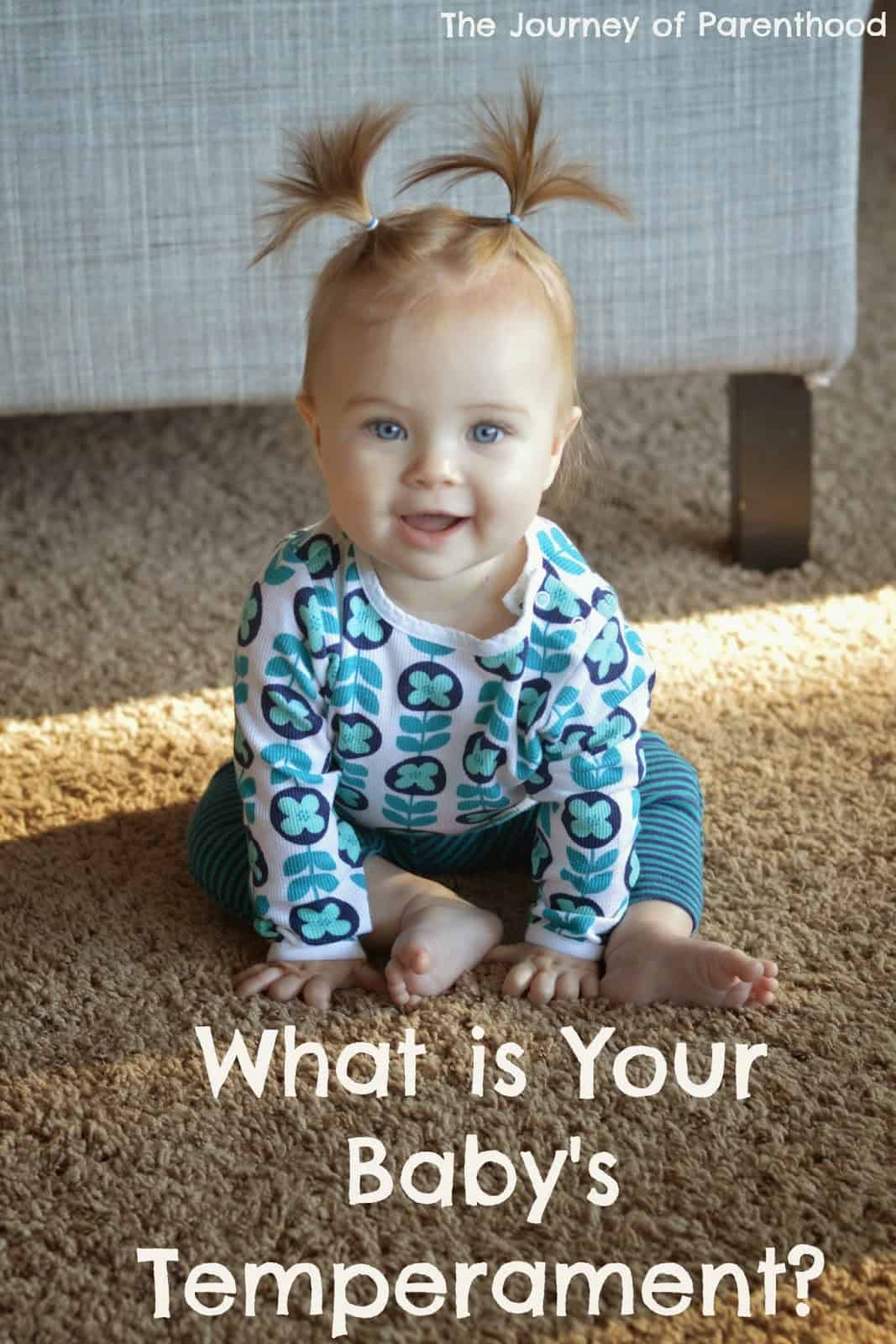What is My Baby’s Temperament?
Getting to know your baby is part of the joys of becoming a mother. Every child is unique and is born with their own individual personality and temperament.
Figuring out what your baby’s temperament is can drastically help in how to best parent your baby.
Whenever a new mom or mom-to-be asks for my book recommendations I always recommend both Babywise

Something I love about The Baby Whisperer (Tracey Hogg) is that her book goes into a lot of detail. My sister-in-law actually is more of a “Baby Whisperer” parent than a “Babywise” one. I lean more towards Babywise with most of my parenting but draw a lot from The Baby Whisperer as well.
One concept I really appreciate from The Baby Whisperer is about temperaments. Different personalities require different approaches when it comes to parenting. I believe firmly in parenting my children equally, but how one child responds to a certain method may differ from the way their sibling responds to the same method.

Hogg presents five different temperament types and lists unique qualities of each. Some babies are ONE temperament while some may be a combination of several different temperaments. Here’s a break down of each with their identifying factors to help determine which temperament best describes your infant:
1. Angel:
- A “dream baby”
- Easily adapts to their environment and any changes you throw their way
- Rarely cries as a baby
- When cries it’s easy to read cues and meet needs
- Predominant emotional style is easygoing and even-tempered
- Often referred to as an “easy baby”
- Easy to calm or distract when upset
- Never rattled by loud noises or bright lights as a baby
- Very portable
- Can easily run errands and such without worries of a meltdown
- A good sleeper early on
- Needs very little encouragement to go to sleep
- When wakes early will just babble happily in crib
- Social baby, smiles easily to everyone
- Fits in easily when confronted with new situations
- Generally good eaters
- Open to trying new foods
- High tolerance for change
- Plays independently early on
- Easygoing and upbeat personality
- Steady and predictable moods
2. Textbook:
- Reaches milestones like clockwork
- Very predictable
- Easy to read cues
- Mostly mellow, but has cranky periods
- “By the book”
- Relatively easy to calm when upset
- Goes with the flow as long as things are introduced slowly and gradually
- Most “firsts” are pretty uneventful
- May take a little while to fall asleep, just like books predict
- Responds well to simple reassurances if wakes
- Easily amused on own
- Independent early-on
- Not afraid of other babies
- Fairly good in new places
- Takes a little while to adjust to changes
- May need solid foods introduced slowly
- Moderately active
- Easy to choose appropriate-level toys
- May need calming from parent if overstimulated

3. Touchy:
- Represent around 15% of all children
- Ultra-sensitive early on
- Emotionally high-strung
- Easily excitable
- Flinches at noises
- Blinks and turns away from bright lights
- Cries often and for no apparent reason
- Everything must be “just right” in sleep environment
- Slightest noises disturb sleep
- Difficult to get back to sleep once awake
- New things have to be introduced extremely slowly and gradually
- Often referred to as “inhibited” and “highly reactive”
- Experiences fear and other feelings more intensely
- Shy of strangers
- Bashful, fearful and cautious
- Tends to clutch to mother in new situations
- Will come out of shell with lots of time and patience
- Great at puzzles and and games that require concentration
- Often become quite good students
- Tends to get easily frustrated
- Desire to eat can be easily upset
- May have trouble latching on if breastfed
- Typically refuse to eat solids when first introduced
- Very cautious about new toys, new situations, etc
- Needs a lot of support when faced with transitions
- Lower activity levels…needs encouragement to participate
- Less sensitive in the morning time rather than afternoon and evening
- Needs all stimulations blocked out in order to sleep
4. Spirited:
- Represents around 15% of all children
- Aggressive
- Very vocal
- Loud screams always let parents know “I need you now
- Jumps right into the action
- Always wants whatever siblings or other children are playing with
- Loves stimulation
- Drawn to anything that bangs, pops, or flashes
- Often not a good sleeper
- Eats well but can’t sit still at table for very long
- Enjoys climbing
- Often gets into dangerous situations
- Sometimes may bite or push other children
- Throws fits when not given what wants
- Often referred to as “aggressive” or “uninhibited”
- If properly handled usually become strong leaders
- Difficult to parent
- May be impatient with eating
- Very active, high energy
- Exercises very little impulse control or caution
- Usually more cooperative in the morning
- Tend to resist naps and night time rituals
- Need all stimulation blocked out in order to sleep
- Don’t want to “miss anything”
- Opinionated, often stubborn
- Moods are mercurial – going quickly from happy to sad and back again
- Tantrums are difficult to calm
- Transitions can be difficult
- Parents often feel like they don’t have enough energy to keep up
5. Grumpy:
- Difficult to make smile
- Seems to have a “chip on their shoulder” even at a young age
- Dressing and diapering are always a challenge
- Cries angrily when swaddled
- Voices displeasure whenever even slightly veered off schedule
- Feeding is often difficult
- Breastfeeding takes a lot of work: difficult to latch on and stay on
- Often not a great eater and slow to adapt to solid food
- Gets upset if food isn’t given when wanted and how wanted
- Social when wants to be
- Tends to hold back and assess new situations
- Prefers to play on own
- Tends to resent other children for being in their space
- May be referred to as an “old soul”
- Has their own mind and uses it
- Tends to teach parents patience
- Good at maintaining their own boundaries
- Very independent
- Easily amuses self
- Very impatient eater
- Feedings tend to take a long time
- Doesn’t adjust well to solid foods
- Tends to insist on eating the same food over and over
- Prefers to use eyes and ears in playing rather than bodies
- Hates being interrupted
- Has a difficult time stopping one activity and beginning another
- Sleep doesn’t come easily
- Often get overtired due to resisting sleep
- Tend to need to fuss themselves to sleep
- Often will only “catnap”
- Requires routine
- Slightest variation from routine can cause issues
Knowing and understanding your baby’s temperament can help you know the best way to parent for their needs.
It can also help you give yourself some GRACE. A “difficult baby” can simply be due to their natural temperament. It helps relieve some of that stress and pressure by realizing a baby’s disposition is something they are born having, not something you’ve done “wrong” in some way!
Have a grumpy, touchy or spirited baby? Don’t be discouraged! Even though nature may decide a baby’s temperament but with the proper nurturing and patience, temperaments can be overridden.
Have an angel or a textbook baby? Feel appreciative! And focus on putting forth conscious efforts so those temperaments can be fostered throughout childhood into adulthood.
As a mother of four, I can tell you that the way I have parented my textbook child vs my grumpy child have had to be very different. It’s important to meet our children where they are and find the best ways to communicate, connect, and guide them.
Just because your first baby may be an “angel baby” doesn’t mean they all will be either. Every child is different. I do think birth order may influence temperaments too though, don’t you? So many people I talk to have textbook first babies and then a grumpy or spirited and then an angel!
Knowing their temperaments from an early age helps gives that parenting edge to really set the groundwork early on in their lives to allow them to be successful and to be connected to who they are as a person!
Which temperament best describes your baby? Are there things about your parenting style that need to be adjusted to better fit your child’s temperament?
- A Letter to my Son on His 16th Birthday From Mom (Kye’s Bday Letter) - March 20, 2025
- Open Letter to my Daughter on her 12th Birthday – Love, Mom {Britt’s 12th Bday Letter} - January 16, 2025
- Letter to My Son on his 6th Birthday – Love Mom - January 8, 2025






